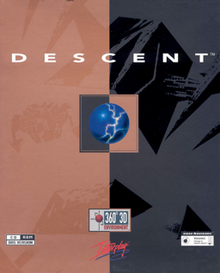Motion Sickness Gets Six Degrees of Freedom with Descent – Today in History – March 17th 1995
The charge of 20th anniversaries just won’t let up as we see another iconic game celebrating that special date. Descent by Interplay was one of those games that you either “got” or you didn’t. There was no real “middle ground” to speak of. Tasked with clearing out mines of malfunctioning equipment, you will have a tough time if you are unable to get past the feeling of depth, motion and cannot think in full three dimensions. The floor can easily become a wall and a wall can easily become the ceiling, and that is just the beginning of your problems in Descent.
Descent was alone at launch
When Descent was released the average power of a personal computer was quite low. So low that the speed of the CPU was not measured in gigahertz, rather it was measured in megahertz. Take the average modern CPU which is about 4,000 megahertz. When Descent was released the CPU speed was around 50 megahertz. Now, what did you get from all of the computing power?
Nowhere high resolution
First up, the game was “low resolution” at 320x200 (about what the Sega Genesis was capable of producing) with later iterations and updates allowing 640x480. Second, the game was fully 3D with you not being stuck with only traversing the level on a flat plain. In Descent there is no up and there is no down and you will get lost rather easily and quickly.
Descent ports to other platforms
Descent has been released on various platforms over the years from the original PlayStation, DOS and Macintosh. Planned versions were to be seen on the Nintendo 64 and WiiWare platforms but neither have materialized.
Descent has influenced several generations of games over the years. While most players were playing Doom and being amazed at the single plain of entertainment, Interplay was showing gamers a whole labyrinthine filled experience that was hard to top.
Giving back to fans
The source code for Descent is freely available, under various licenses that may or may not restrict commercial projects. Want to own your very own copy of this classic? Check eBay or Amazon

